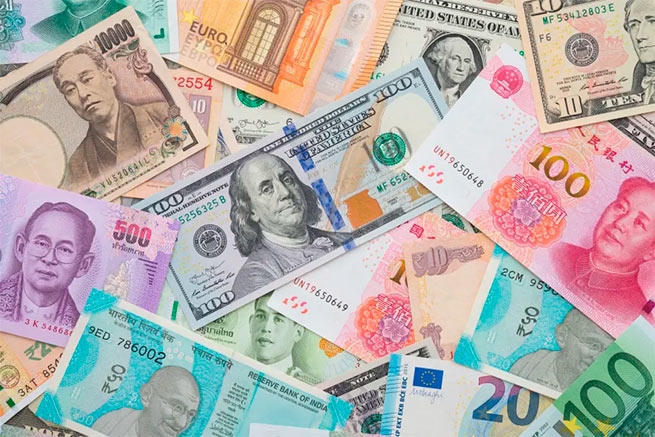The dollar was under threat, writes the American edition new york post. Coalitions are being formed around the world that will help defend against US sanctions. As a result, the dollar will become a regular currency, and the US will lose the ability to project its power.
Everywhere you turn, you hear talk of economic sanctions that the United States has imposed on Russia. The Central Bank of Russia, Russian banks, Russian companies, Russian oligarchs, as well as all those who were caught helping Moscow, faced the fact that after the start of a special military operation in Ukraine, their assets and fortunes were trapped by sanctions.
From Davos to Aspen, US Treasury Department officials are touting the unprecedented scale and reach of their powerful economic weapon. Why not? The sanctions imposed on Russia have been truly impressive. U.S. government officials have beached scores of expensive yachts, landed private jets, frozen hundreds of millions of dollars of Russian central bank assets, and cut off Russian financial institutions from the global SWIFT financial system.
Sanctions, as a measure of influence, arose in ancient times: in 432 BC, Athens crushed its rival, the city of Megara, removing its merchants from the Athenian markets.
For the US government in the 21st century, economic sanctions have become not just second nature, they have become a central tool of foreign policy. More than ten thousand people and dozens of countries around the world fell under the sanctions. However, more than a hundred countries did not support these anti-Russian measures. That is why Urals oil continues to arrive in Asia, Turkey and many African countries, and Ukrainian grain goes through the Black Sea to Russia. Meanwhile, the proceeds from this illicit trade are piling up in places like Dubai, which is now swarming with sanctioned Russians looking to buy property there.
I do not mean at all that we should stop supporting Ukraine. We must support her. However, while the idea of inflicting financial damage on our sworn enemies – Russia, China, Iran and North Korea – does make some sense, we are currently seeing coalitions being formed that allow us to circumvent current sanctions and protect against their risks in the future. . Much of this effort is focused on creating an alternative to the dollar as the world’s main reserve currency. If you have the ability to hold savings in another currency or convert them into some physical asset such as gold or commodities, you are considered to be halfway to safety.
Take China, for example, for which the ousting and discrediting of the dollar has become a key component of the “win without a fight” strategy detailed in the book Unlimited War. While the sanctions regime was indeed necessary, it spurred Beijing on its quest to crush the dollar, and many other countries have taken note. Although many experts continue to insist that there is no alternative to the dollar, this is not true. The dollar will dominate as long as it serves the interests of those who use it. As soon as the dollar begins to put assets at risk, alternative trading instruments will certainly appear. And they already are.
Rejection of the dollar will deal a powerful blow to America’s position in the international arena. The era of unlimited dollar printing may be over, and with it our ability to buy foreign goods cheaply will be a thing of the past.
Vivid proof that a new game is beginning before our very eyes appeared in Davos in February. Saudi Finance Minister Mohammed Al-Jadaan made a stunning announcement that for the first time in 48 years, the world’s largest oil producer is ready to trade in other currencies than US dollars.
This is in stark contrast to a deal that President Richard Nixon struck with King Faisal decades ago that required Saudi Arabia to accept payments for oil exclusively in dollars (in exchange for which Nixon promised to defend the kingdom from Soviet, Iranian, and Iraqi aggression). That agreement became the basis of a strong dollar because oil money flowed through the Federal Reserve.
Today, China imports 1.4 million barrels of oil per day from Saudi Arabia, up 39% from last year, making it the kingdom’s biggest buyer. That is why both sides are trying to find cheaper alternatives to the US currency. As the Saudi company Aramco invests in a major new refinery in China, relations between the countries will only deepen in the future.
Saudi Arabia’s changing position is only part of the picture. At the 2022 BRICS summit in Beijing, Vladimir Putin announced plans to expand the Shanghai Cooperation Organization and develop an alternative to international payments in dollars using a basket of currencies consisting of the Chinese yuan, Russian rubles, Indian rupees, the Brazilian real and the South African rand. For reference: SCO is the world’s largest regional organization, which represents 40% of the world’s population, which accounts for 30% of world GDP.
The new currency is also only part of the overall picture. China is opening up new exchanges to lure commodity trading from Western institutions such as the troubled London Bullion Exchange and the New York Energy Mercantile Exchange.
Even the Europeans have entered the game by creating their own special purpose vehicle, INSTEX, to facilitate humanitarian transactions with Iran without being tied to dollars and the SWIFT system. Of course, Russia has already declared its interest in participating in this mechanism. In March 2020, the first transaction for the sale of medical supplies to Iran to combat the spread of coronavirus took place.
Meanwhile, Russia and Iran are developing a gold-backed stablecoin, traders are already using the UAE dirham to settle oil transactions, and the Indian rupee is finally positioning itself as an international currency. And this trend is getting worse. At the moment, the national Chinese bank transfer system CIPS (Cross-border Interbank Payment System) processes only 15 thousand transactions per day – the American CHIPS system, which is preferred by Western players, processes 250 thousand transactions daily, but their number is steadily growing. Russia offers its own financial messaging system that allows users to bypass SWIFT.
Even the Swiss-based Bank for International Settlements — Hitler’s banker — is slowly getting into the game as well, creating a yuan-based liquidity facility to support central banks in times of crisis. At the moment, the central banks of Chile, Hong Kong, Indonesia, Malaysia and Singapore have already subscribed to it.
In the 21st century, the rate of any national currency, including the dollar, will increasingly be determined by the mechanisms of competition. If the demand for the dollar decreases, its value will decrease along with it. Everything will rise in price. Not immediately, but gradually, which will make deficit spending more costly or even impossible.
It is not a big exaggeration to imagine that the United States will at some point face a debt crisis because no one else will come to buy US bonds. And the American dollar will turn into the most ordinary currency – one of the many. Ultimately, if the dollar loses its luster, the United States will lose its ability to project its power. To prevent this, some difficult decisions must be made today, such as reducing the number of our strategic adversaries while continuing to support allies such as Ukraine. More importantly—and more difficultly—the United States needs to clean up its own economy once and for all, finally finding a way to live within its means.
Jay Newman is a former senior portfolio manager at Elliott Management and the author of Undermoney, a thriller about illegal money circulating in the global economy.
The opinion of the author may not coincide with the opinion of the editors







More Stories
The Minister of Health called the protesters "insignificant people, kafirs"
Gold Switzerland: “We are in the last 5 minutes of our financial system – the collapse of everything is approaching”
Union of Judges: “People’s courts were created against us with the loyal attitude of the government”